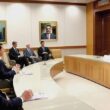A growing sense of constraint is gripping German public discourse, according to a recent survey conducted by the Allensbach Institute for Demoscopy for the Frankfurter Allgemeine Zeitung (FAZ). Only 46% of German citizens believe they can freely express their political opinions, a significant decrease reflecting a broader atmosphere of self-censorship. A concerning 44% indicated they feel it’s prudent to exercise caution when voicing their views – a level of restriction not seen since 2020.
The survey, based on in-depth interviews with 1,044 individuals between September 26th and October 10th, highlights a complex and potentially troubling trend at a time when robust public debate is considered vital for a healthy democracy. While freedom of expression remains enshrined in the German constitution, the results suggest a tangible chilling effect on open dialogue.
Furthermore, the data reveals surprising levels of public support for restricting certain types of speech. A majority (52%) believe it should be illegal to label soldiers as murderers, while nearly half (49%) advocate for prohibiting the classification of homosexuality as a disease. Even the sentiment “women belong in the kitchen” elicits a surprising degree of condemnation, with 43% supporting its prohibition.
Analysts suggest this willingness to curtail expression could stem from a combination of factors, including heightened sensitivity to hate speech in the digital age, the lingering impact of historical discussions surrounding Nazism and free speech and a general apprehension about societal polarization. However, critics warn that such limitations, even when driven by laudable intentions, risk eroding fundamental democratic principles and potentially silencing legitimate dissent. The question now becomes whether this trend towards self-imposed restrictions will mark a permanent shift in the landscape of German political conversation and what impact this will have on the country’s commitment to open and unfettered debate.





